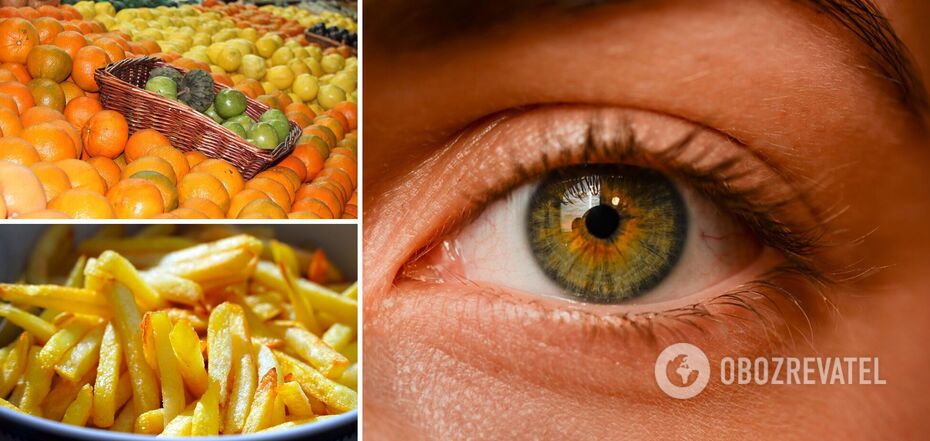Society
Doctors explain which products are good or harmful for eyesight
From birth, people perceive the world around them through hearing, sight, taste, smell, and touch, so disruptions in their functioning significantly reduce the quality of life. Sight is one of the most important senses, without which it is difficult to imagine a full-fledged existence, so you should constantly take care of it. Eye diseases are easier to prevent than to treat. However, everyone can do it.
It is well known that proper nutrition can have a positive effect on the body and prevent diseases. Thus, 24/7 Wall St. has made a selection of foods to avoid and those that will be good for your eyes.
With age, the body's systems begin to work differently, and the eyes are no exception. Negative environmental influences, continuous digitalization, radiation, and certain drugs all harm our vision. Regular unhealthy eating can harm, which is why you should understand how your daily menu affects your eye health.
What foods are harmful to the eyes?
Seasonings
When cooking our favorite dishes, we use sauces, mayonnaise, or dressings to add flavor. When consumed frequently, these products are harmful to overall health, including the eyes. This is due to the large amount of sugar in their composition. It leads to narrowing of blood vessels in the eyes and fluid accumulation, which can cause glaucoma.
French fries
French fries are among the most harmful foods for the human body. The way they are cooked is particularly dangerous as frying vegetables in a large amount of oil deprives them of all their nutrients.
Trans fats accumulate in French fries and can clog arteries, leading to high blood pressure and hypertensive retinopathy.
Processed foods and ready meals
Processed and canned foods contain too much salt and trans fats, which cannot be healthy. Excessive salt intake causes high blood pressure, which can temporarily increase eye pressure.
There is no less salt in ready-to-eat meals, which are convenient but not healthy. Their regular consumption leads to fluid retention in the body and causes the heart to work harder, which in turn causes an increase in pressure, including in the eyes.
Sweetened drinks
Sugar, fructose, and corn syrup are ingredients that add flavor to sweet foods and drinks. Excessive amounts of them are harmful to humans because they cause high cholesterol and increase the risk of high blood pressure.
Too much sugar in the diet can damage the small vessels that supply blood to the retina and lead to long-term vision loss.
What foods are good for the eyes?
Red pepper
Peppers are one of the healthiest vegetables, but red peppers contain the most vitamin C, which helps blood vessels stay healthy. It is also a source of vitamin E, which can slow down the development of macular degeneration and cataracts.
Fish
In general, fish is very beneficial for the eyes as it is a valuable source of omega-3 fatty acids that help protect them from macular degeneration. The best choice may be salmon, sardines, or herring.
It should be noted that large fish, such as shark, mackerel, or tilefish, should be consumed with caution as they can accumulate mercury, which can damage the eyes.
Nuts and flax seeds
Various types of nuts should be included in your diet. They contain omega-3 fatty acids and vitamin E, which prevent age-related eye damage.
Flax seeds are also a source of omega-3s. In addition to reducing the risk of glaucoma, flaxseeds can reduce the risk of diabetes, cancer, and heart disease due to their antioxidant and fiber content.
Orange foods
Orange fruits are the best source of vitamin C, which is key to eye health. In addition, they contain anti-inflammatory carotenoids: lutein and zeaxanthin. They protect the eyes from negative effects by absorbing excessive light energy.
Carrots also have a positive effect as they contain carotene, which the body converts into vitamin A, helping the eyes process light.
Broccoli
Broccoli is considered a good supplier of macronutrients that are beneficial not only for the eyes but for the whole body. At the same time, the special antioxidant sulforaphane protects the eyes from oxidative damage and reduces the risk of age-related blindness.
Whole grains and legumes
Whole grains are enriched with antioxidants, lutein, and zinc, which has an anti-inflammatory effect and protects eye tissue from light.
Beans or peas can protect the retina, reducing the risk of macular degeneration and cataracts. This is possible thanks to the bioflavonoids and zinc they contain.
Water
Dehydration can be dangerous for the body. Insufficient water does not cause eye diseases, but it does lead to dryness and unpleasant sensations.
Not only water in the diet but also living in a hot climate or staying in a dry room can affect the hydration of the eye mucosa.
As you can see, eye health is affected not only by the environment but also by the way we live and eat. Of course, food alone cannot cure an existing disease, but a proper and balanced diet throughout life can help reduce the risk of developing diseases and maintain clear vision for many years.



























